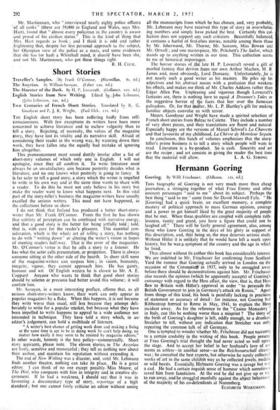Hermann Goering
Goering. By Willi Frischauer. (Odhams. 12s. 6d.)
THIS biography of Goering is not very much more than cheap journalese, a stringing together of what Frau Emmy and other eminent personages "said to me" about its subject. Perhaps the best thing " said to me " came from Sir David Maxwell Fyfe. "He [Goering] had a quick brain, an excellent memory, a complete mastery of political approach to mass German opinion, courage and a power to get himself liked by the great majority of people that he met. When these.qualities are coupled with complete ruth- lessness, vanity and greed, you have a figure that could not be laughed off." There will be fairly general agreement, also, among those who knew Goering in the days of his glory in support of this description, and, that being so, the man deserves serious study. Without Hitler it is unlikely that he would have left a mark upon history, but he was_a_symptom of the country and the age in which he lived.
Thus almost without its author this book has considerable interest We are indebted to Mr. Frischauer for confirming from Scotland Yard the rumour that Goering actually arrived in London on the occasion of the Coronation' in 1937, only to be smuggled away before there should be demonstrations against him. Mr. Frischauer also records the opinion '(which he apparently accepts) of Goering') entourage with regard to the Hess affair, the view, that is, that Hess flew to Britain with Hitler's.approval in order " to persuade the British Government to join io.Germany's attack do Russia." Apart from things of this kind, his book is painfully lacking in precision of statement or accuracy of detail ; for instance, not Goering but Ribbentrop hurried to Rome in May, 1941, to explain the Hess incident away. As for the reference to the "Casino Monastery in Italy, can this be nothing worse than a misprint ? The story of the birth of Goering's daughter is left, oddly enough, to a drunken Streicher to tell, without any indication that Streicher was only repeating the common talk of all Germany. One is tempted to wondeiwhether Mr. Frischauer did not succumb, to a certain credulity in the writing of this book. People present at Frau Goering's trial thought she had never acted so well upon the stage. And to accept her belief in her husband's love of art seems as artless—in another sense—as the Reichsmarschall clearly was ; he consulted the best experts, but otherwise he surely collectej works of art in the same childish way as he collected jewels, medals or wild beasts. Essentially. Ilbtmann Goering was a savage but not a cad. He had a certain roguish sense of humour which sometinws saved him from fanaticism. At the end he did not give up or Ir}• to run away, and he struggbd manfully against the abject behaviowr of the majority of his co-defendants at Nuremberg.
ELIZABETH WISKEMANti


































 Previous page
Previous page